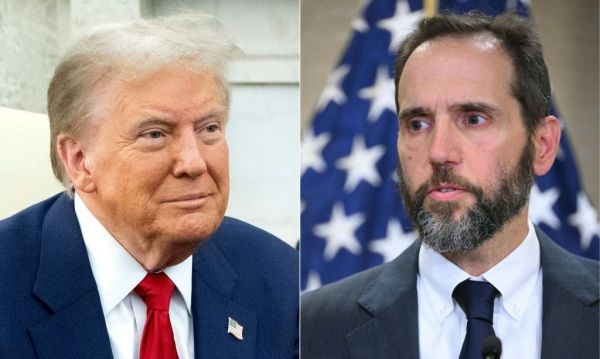Where are we now, four years after January 6, 2021?
On that day, Donald Trump urged a massive crowd of supporters to march on the U.S. Capitol in protest of the fair and free 2020 presidential election. That march ended with a mob storming the Capitol building, a violent disruption of the proceedings of counting the electoral votes, and the eventual impeachment of the outgoing president.
Today, Congress will certify that impeached president’s 2024 electoral victory, and Trump is now just days away from his second inauguration, reclaiming the White House with his dual messages of restoration and retribution. His opponent this time, Vice President Kamala Harris, argued unconvincingly that Americans should reject the man who tried to steal the election four years earlier. And the president whose election the January 6 mob had tried to stop, Joe Biden, is running out the clock after just one term, having failed to fulfill the purpose voters gave him: keeping Trump out of the White House.
But has Biden learned the lesson about January 6 that some of his fellow Democrats are trying to impart, that pointing repeatedly to Trump’s association with that attack—without offering a good reason for people to vote Democratic—may be counterproductive?
It seems not. Biden has bookended his presidency, which began in the wake of January 6, with a gesture that reinforces just how partisanly coded the event has become. Last week, the White House announced that among the recipients of the Presidential Citizens Medal are Democratic Rep. Bennie Thompson and former Republican Rep. Liz Cheney, who together chaired the House Select Committee to investigate January 6 and Trump’s role in it.
“Throughout two decades in public service, including as a Congresswoman for Wyoming and Vice Chair of the Committee on the January 6 attack, Liz Cheney has raised her voice—and reached across the aisle—to defend our Nation and the ideals we stand for: Freedom. Dignity. And decency,” read the official White House statement on her selection for the award. “Her integrity and intrepidness remind us all what is possible if we work together.”
That is, broadly speaking, the Democratic view of Cheney’s congressional career-ending refusal to accept Trump back into the Republican fold after January 6. It reflects how most elected Democrats and their supporters interpret the rioting as an affront to American democracy and the rule of law. From this perspective, Trump’s support of the effort to overturn the election should disqualify him from being president again. While that view may more or less align with the facts, Kamala Harris discovered in November that it hardly aligns with the priorities of the majority of voters.
When asked on Sunday by CBS anchor Margaret Brennan about why Americans disregarded Trump’s involvement with January 6 on Election Day, former House Speaker Nancy Pelosi took a more clear-eyed position.
“I wouldn’t say that the American people disregarded this,” Pelosi said. “They just had a different view as to what was in their interest, economically and the rest.” (The “rest”, as the liberal journalist John Judis argues, includes the sort of culture and social issues with which Democrats appear increasingly out of step.)
But Biden, in his political dotage, could not resist sending another signal to the Democratic tribe.
Meanwhile, Republicans seem to have internalized their own wrong lessons about January 6. It seems there are practically no political consequences for Republicans who accept the lies underpinning the riot or deny Trump’s complicity, and Cheney’s supposed betrayal of Trump is worse than Trump’s betrayal to the constitutional order.
“Biden gave Liz Cheney a Medal yesterday, even though she has proven to be totally corrupt,” Trump posted on Truth Social on Friday, and also accused her of destroying and deleting evidence from the committee’s investigation. Those claims were made in a report released in mid-December by Rep. Barry Loudermilk, who chairs a House Oversight subcommittee, calling for Cheney to be criminally investigated.
Sen. John Barrasso, who served alongside Cheney in the Wyoming congressional delegation, was nearly as harsh. ”“President Biden was either going to pardon Liz Cheney or give her an award. She doesn’t deserve either,” said Barrasso in a statement. “She represents partisanship and divisiveness – not Wyoming.” And Fox News analyst Brit Hume called the decision to honor Cheney and Thompson “repulsive” and called their committee work a “show trial.”
Even more tellingly, Republicans and conservatives have focused almost entirely on Cheney and the committee’s supposed missteps and overreach. (Newly reelected House Speaker Mike Johnson, for instance, has promised the House will continue its investigation into the investigation into January 6, which since beginning in the spring of 2023 has gone on longer than the original select committee’s probe.) Beyond the most ardent Trump devotees, however, there is little interest among elected Republicans in defending or excusing the actual events of that day.
The seeds for all of this were sown in the weeks after the attack on the Capitol, when then-House Republican leader Kevin McCarthy made his pilgrimage to Mar-a-Lago to reaffirm the party establishment’s support for Trump. At the same time, the outrage among other Republicans on Capitol Hill, including Senate Minority Leader Mitch McConnell, curdled into benign neglect. The criminal courts, not the political process of impeachment, would deal with the Trump problem, they thought.
So what would be the right lessons from January 6? For the GOP, it’s that nipping their Trump problem in the bud through the political process of impeachment was the only conceivable way to address the outrage nearly all elected Republicans felt in the days after the Capitol riot. And for Democrats, it might be that the outrage over Trump thumbing his nose at the democratic process and the constitutional order may be necessary, but it isn’t sufficient for winning. With a more responsive policy agenda and viable candidate who spoke to the current needs of the average American voter, Democrats might have been able to block Trump from winning the presidency again.
Yet here we are, in 2025, with the justice system having failed to reckon properly with Trump’s actions leading up to January 6. For Republicans, Trump is no longer a problem but an answer for the way forward. It took four years, but the former president’s attempt to will his way back into power has succeeded. Lesson learned.







Please note that we at The Dispatch hold ourselves, our work, and our commenters to a higher standard than other places on the internet. We welcome comments that foster genuine debate or discussion—including comments critical of us or our work—but responses that include ad hominem attacks on fellow Dispatch members or are intended to stoke fear and anger may be moderated.
With your membership, you only have the ability to comment on The Morning Dispatch articles. Consider upgrading to join the conversation everywhere.